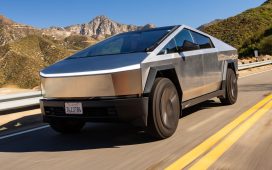Oh, the handwringing and boohooing from car dealers and fossil fuel companies about electric cars. Amid their crocodile tears, they are blubbering about how nobody wants to buy electric cars. If that is the case, how, then, to explain that Volvo sold more cars in a single month than ever before in the history of the company, led by a surge in sales of battery electric and plug-in hybrid vehicles?
Volvo sold 78,970 vehicles worldwide in March 2024, a 25% increase over the same month last year. That’s interesting, but the real news is that sales of fully electric cars were up 43% and accounted for 23% of all Volvo sales globally last month. Volvo sales in Europe, the company’s top market, rose 33% in March. Even better, sales of its fully electric cars rose 66% over the total a year ago. In the US, its total sales rose 50%, lifted by plug-in hybrid models, while sales of its fully electric cars declined 66% percent, according to a report by Reuters.
“We are making good progress towards our annual sales target of at least 15% growth and in the months ahead we will focus on ramping up sales of our EX30,” Volvo Cars said in a statement. The company said in January it remained confident of “tremendous growth” in the electric vehicle market and expects electric cars to account for half of its sales by the middle of the decade. Volvo has said it will sell only EVs by 2030.
Volvo Gets Big Boost From Small Car
The increase in battery electric sales has been supercharged by the introduction of the Volvo EX30, which is both the smallest car ever made by the Swedish brand and the fastest. The EX30 starts in America at just $34,995, yet in dual motor trim is a blink of an eye faster than the Tesla Model Y performance — 0–60 mph in 3.3 seconds versus 3.4 seconds for the Model Y. Volvo emphasized the smaller size of the EX30 in a humorous YouTube video last year entitled “The Unboxing.”
Kyle Field was in attendance for the North American reveal last year and filed a report based on his experiences test driving one in Barcelona in the fall. To say Kyle was impressed would be a gross understatement. He raved about the car’s performance and handling, its exhilarating acceleration, and its rock steady cornering ability.
Kyle also was impressed with the actual size of the EX30, which has approximately the same dimensions as the Chevy Bolt EUV and Hyundai Kona Electric. “After seeing the EX30 in person, it feels like a solid win for the brand, bringing Volvo’s signature Scandinavian design and safety to even more customers around the world. Volvo continues to push the pace on its transition to selling only fully electric vehicles by 2030, and achieving carbon neutrality by 2040,” Kyle wrote.
Just three days ago, Maximilian Holland reported that the Volvo EX30 has experienced a meteoric rise in sales in Sweden, which helped boost the percentage of battery electric vehicles in that country to nearly 35% in March. Adding in plug-in hybrids brought sales of electrified cars in Sweden to more than 58% of the new car market.
Production On Two Continents
According to Volvo, production of the EX30 started last year in Zhangjiakou, China. Deliveries of those cars has already begun in several countries, including Sweden. The decision to also build the EX30 in Ghent boosts production capacity for expected EX30 demand in Europe as well as for global export, and reflects Volvo Cars’ ambition to build its cars where it sells them as much as possible. The decision also adds production flexibility for what the company expects to be one of its best selling models in coming years. Volvo already builds its XC60 and XC40 vehicles in both Europe and China.
“Our ambition is to sell the EX30 around the world at an attractive price point, easing the transition to driving an electric Volvo car for more people while also contributing to company margins,” said Jim Rowan, Volvo Cars’ chief executive. “Adding production in Ghent is a logical move as we aim to capture the strong demand for our exciting small electric SUV across the globe.”
The Takeaway
There has been a lot of talk lately about the EV revolution running out of steam. There has been a certain cooling in EV sales in several countries, but to assume that means the switch to electric cars is over is a position only a diehard internal combustion fan would take. Many EV critics attempt to paint them as too expensive for many people to afford, yet Volvo cars tend to fall into the luxury end of the new car market and are seldom thought of as economy cars. Nevertheless, Volvo sales are soaring, spurred in large part by sales of battery electric cars, which must be confounding to EV naysayers everywhere.
You would like to think that if Volvo can bring electric cars to market that people actually want to buy, other manufacturers would be able to do so as well. Don’t write off the transition to electric cars quite yet.
Have a tip for CleanTechnica? Want to advertise? Want to suggest a guest for our CleanTech Talk podcast? Contact us here.










